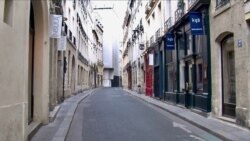The flower sellers and boisterous protests are nowhere in sight. Nor are the crowds usually attending the far-right National Rally’s traditional demonstration at the Joan of Arc statue in Paris.
This year’s May Day in France under coronavirus lockdown is a strange event, with the usual festivities and demonstrations migrating online or within the confines of homes. And with the pandemic battering the French economy and jobs, there is little to celebrate on Workers’ Day.
“This first of May is like no other,” said French President Emmanuel Macron in a video to the nation posted on Twitter Friday, adding however “the spirit of solidarity among workers has never been so strong.”
Many are not so sure.
Unions and opposition parties used the day to organize pot-banging concerts and online demonstrations to protest a myriad of government policies, including its plans for slowly easing a nearly two-month lockdown.
“If he praises the workers, he should show it,” Philippe Martinez, head of the hardline leftist CGT trade union told French radio of Macron, whom he has locked horns with on numerous occasions, including during last year’s pension protests.
Tough times for workers
May Day is being marked as France and the broader eurozone economy are grappling with the devastating fallout of COVID-19.
Statistics out this week found the country’s GDP shrank 5.8 percent in the first quarter of this year, while unemployment rose a record 7.1 percent in March.
The victims of the downturn include the country’s celebrated muguet, or lily of the valley, handed out every May 1st—a tradition dating back to the 16th Century.
With florists shuttered and street sellers banned, muguet producers fear losses of 70 percent this year, even though some flowers were available online and at bakeries and food stores.
Earlier this week, Economy Minister Bruno Le Maire sketched bare details of a post-recovery plan, including repatriating supply chains in key areas like pharmaceuticals, and emphasizing a green relaunch, including for national carrier Air France.
“It would be an historic error to craft a shoddy recovery based on fossil fuels,” he told a parliamentary committee.
The French government is also trying to limit the economic hit on businesses and people, offering massive loan guarantees for companies, and subsidizing compensation packages for idled workers.
Critics say these and other recovery measures are insufficient, and blast the government’s post-confinement strategy they say was rammed through parliament this week.
“It’s been picked just to get people back to work,” Adrien Quatennens, senior member of the far-left France Insoumise (France Unbowed) told local radio of the May 11 date set for easing the lockdown.
Banging pots and anxiety
On Friday, the Unbowed party organized a midday “casserolade,” urging French to bang pots and other kitchen utensils from windows and balconies to protest the government’s “improvised” handling of the pandemic.
“Confined but not gagged,” one supporter tweeted, while others posted noisy videos of their kitchen concerts.
In Paris, far right leader Marine Le Pen, sporting a face mask and sash with the national colors, apparently defied lockdown rules to lay the party’s traditional wreath in front of the Joan of Arc statue. She also took time to blast some of the government’s measures, including a controversial decision to begin reopening schools.
“A successful de-confinement is one in which there is testing and masks for everyone,” said Le Pen, which is currently not the case.
The government’s plan sees de-confinement happening in stages and differentiated by “risk” zones. It says masks will be available to all citizens by May 11, testing scaled up drastically and that the country will only begin reopening if new coronavirus cases remain below 3,000 a day.
“May 11 will be an important step,” Macron said Friday, but it won’t be a return to normal life.
France counts among the countries hardest hit by COVID-19, with nearly 170,000 cases to date, although infection and death rates have been falling.
Still, a new Elabe poll suggests rough times ahead for the government, as it faces the next stage of the crisis. Published Wednesday, it finds more than six in 10 French have lost confidence in Macron and his prime minister, Edouard Philippe - up seven points in a week.
About the same number said they were anxious about the future, once France’s lockdown begins easing.






